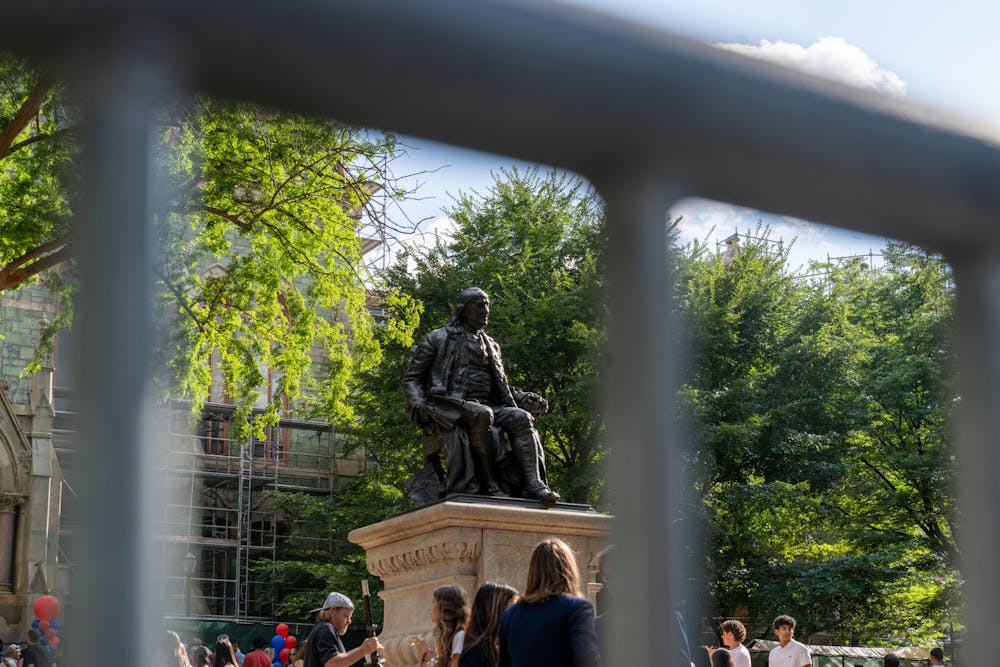
Penn has implemented new policies, task forces, and security measures.
Credit: Ethan YoungThree months after the pro-Palestinian encampment on College Green ended with a police sweep and the arrest of nine Penn students, Penn’s new policies, task forces, and security measures show a University eager to avoid future protests.
While the six-foot fences that surrounded College Hall no longer limit access to campus, the University is operating under a new set of temporary guidelines for campus demonstrations. Over the summer, the University also began a review of the Guidelines on Open Expression — which were last updated in 1993. New metal placards adjacent to College Green and the LOVE Statue state that “overnight occupation” is prohibited and that all events and demonstrations require “prior approval.”
A spokesperson for the University declined to comment on whether they are undertaking specific protest preparations. The Division of Public Safety did not respond to The Daily Pennsylvanian’s request for comment.
As the first week of class begins, activist groups have adopted new protest tactics. Penn Students Against the Occupation of Palestine and the Penn-affiliated Freedom School for Palestine announced they would share daily "Updates from Gaza" in front of the Ben Franklin Statue.
PAO and the Freedom School for Palestine did not respond to requests for comment. The Penn-affiliated, pro-Palestinian group Faculty for Justice in Palestine declined to comment on plans for the semester.
In the announcement of new protest rules, University administrators wrote that the updated guidelines are in response to requests from members of the Penn community for University leadership to clarify and update their guidance and policies related to campus events and demonstrations. The announcement included that “increased clarity” also was a “priority recommendation” in the final reports from both the University’s Task Force on Antisemitism and the Presidential Commission on Countering Hate and Building Community.
When Penn originally announced the guidelines, PAO condemned them, writing that “almost every stipulation in UPenn’s new ‘guidelines’ is a direct response to student-organized action.”
“The guidelines were published without prior input from the Committee on Open Expression,” the statement reads. “Instead, the dystopian restrictions have one goal in mind: stop protesting for Palestine.”
An in-depth analysis of the temporary guidelines this summer by the DP revealed several contradictions, potential loopholes, and ambiguities. The analysis found that the guidelines increase Penn’s vice provost for University Life’s power, redefine events on campus as inherently private to the University community, and specifically prohibit many of the tactics used by demonstrators on campus in recent years.
The guidelines require organizers of “non-academic” events looking to use outdoor spaces on campus to make a reservation two weeks in advance. Organizers are also prohibited from holding events during “stated business hours” without prior permission.
The task force reviewing the guidelines is charged with examining both the temporary and permanent guidelines and making recommendations to the University Council. The task force is chaired by professor of medicine and Chair of the Committee on Open Expression Lisa Bellini alongside Sigal Ben-Porath, a professor of education and faculty director of the SNF Paideia Program.
The review calls for clarity on the guidelines. In a May statement, the Committee on Open Expression wrote that while it believes in defending the principles of open expression set forth in the Guidelines, it also "believes the infrastructure of open expression at Penn needs strengthening consistent with the law.”
A University spokesperson declined to comment on the Committee's status.
Mentions of protest were also present during remarks by University administrators at the Convocation ceremony for the Class of 2028.
“I'm not here tonight to tell you how to think or how to feel about the complex issues that give rise to protest or about the protests themselves,” Provost John Jackson told the incoming students. “Instead, I'm going to ask that you take a deep dive into what it means to convene here together at Penn.”
Interim Penn President Larry Jameson addressed the events of the last semester more subtly, saying that “these can be divisive days.”
Faculty Senate Chair and law professor Eric Feldman, who succeeded Tulia Falleti following her resignation in protest of Penn's decision to disband the Gaza Solidarity Encampment, also acknowledged the protests in a message to faculty.
In the message, Feldman wrote that this year, the Senate will focus on three priorities: open expression, academic freedom, and shared governance.
Political leaders are also attempting to exert control over how the University handles protests. Last week, two United States House of Representatives committees jointly requested information from Penn on how the institution plans to address antisemitism and campus disruptions in the upcoming academic year.
The committee chairs called on Penn to provide information on the "policies, procedures, and concrete measures" the University would be implementing to prevent a recurrence of alleged "antisemitic chaos" from the previous school year.
It remains unclear how Penn will respond to these external investigations.
The Daily Pennsylvanian is an independent, student-run newspaper. Please consider making a donation to support the coverage that shapes the University. Your generosity ensures a future of strong journalism at Penn.
Donate



